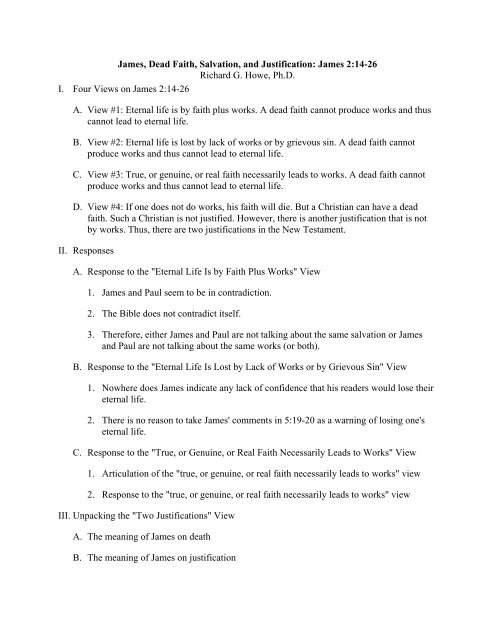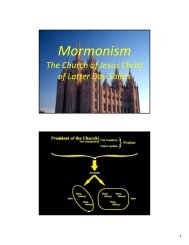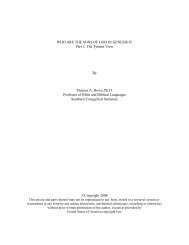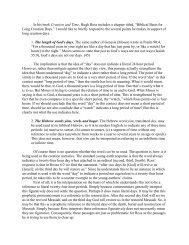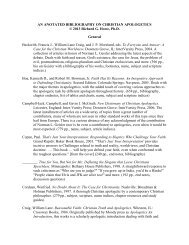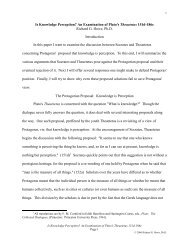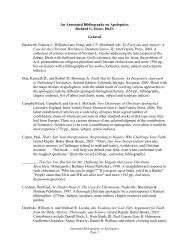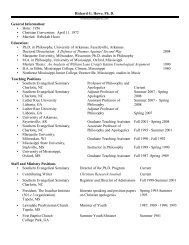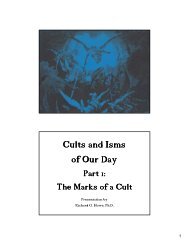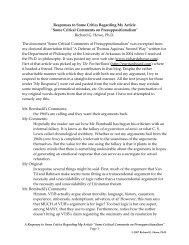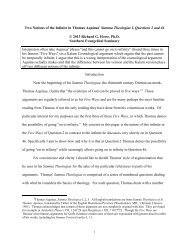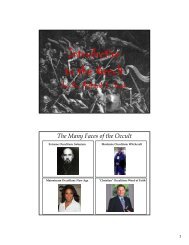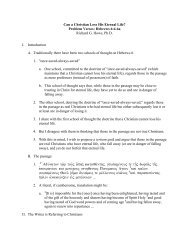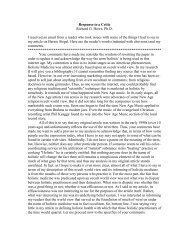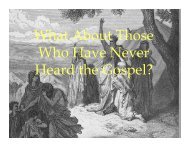Handout 2 - Richard G. Howe
Handout 2 - Richard G. Howe
Handout 2 - Richard G. Howe
You also want an ePaper? Increase the reach of your titles
YUMPU automatically turns print PDFs into web optimized ePapers that Google loves.
James, Dead Faith, Salvation, and Justification: James 2:14-26<strong>Richard</strong> G. <strong>Howe</strong>, Ph.D.I. Four Views on James 2:14-26A. View #1: Eternal life is by faith plus works. A dead faith cannot produce works and thuscannot lead to eternal life.B. View #2: Eternal life is lost by lack of works or by grievous sin. A dead faith cannotproduce works and thus cannot lead to eternal life.C. View #3: True, or genuine, or real faith necessarily leads to works. A dead faith cannotproduce works and thus cannot lead to eternal life.D. View #4: If one does not do works, his faith will die. But a Christian can have a deadfaith. Such a Christian is not justified. <strong>Howe</strong>ver, there is another justification that is notby works. Thus, there are two justifications in the New Testament.II. ResponsesA. Response to the "Eternal Life Is by Faith Plus Works" View1. James and Paul seem to be in contradiction.2. The Bible does not contradict itself.3. Therefore, either James and Paul are not talking about the same salvation or Jamesand Paul are not talking about the same works (or both).B. Response to the "Eternal Life Is Lost by Lack of Works or by Grievous Sin" View1. Nowhere does James indicate any lack of confidence that his readers would lose theireternal life.2. There is no reason to take James' comments in 5:19-20 as a warning of losing one'seternal life.C. Response to the "True, or Genuine, or Real Faith Necessarily Leads to Works" View1. Articulation of the "true, or genuine, or real faith necessarily leads to works" view2. Response to the "true, or genuine, or real faith necessarily leads to works" viewIII. Unpacking the "Two Justifications" ViewA. The meaning of James on deathB. The meaning of James on justification
IV. ConclusionV. Postscript: James And the hypothetical objector (vv. 18-23)James, Dead Faith, Salvation, and Justification: James 2:14-26Page 22 nd ed. © 2012 <strong>Richard</strong> G. <strong>Howe</strong>, Ph.D.
VI. Suggested ReadingsFor materials which would argue for the interpretation of this passage that I am defendingsee:Dillow, Joseph C. The Reign of the Servant Kings: A Study of Eternal Security and the FinalSignificance of Man. Hayesville, NC: Schoettle Publishing, 1992.Hodges, Zane. Absolutely Free. Grand Rapids: Zondervan, 1989.________. Dead Faith: What Is It? Dallas: Redención Viva, 1987.________. The Epistle of James: Proven Character Through Testing. Irving, TX: Grace EvangelicalSociety, 1994.________. The Gospel Under Siege. Dallas: Redención Viva, 1981.________. Grace in Eclipse. Dallas: Redención Viva, 1985.For materials which would argue the common evangelical interpretation (the "True, orGenuine, or Real Faith Necessarily Leads to Works" view) see:Blue, J. Ronald. "James." In The Bible Knowledge Commentary, John F. Walvoord and Roy B. Zuck,eds., 835-827. Wheaton, IL: Victor Books, 1983.Horton, Michael, ed. Christ the Lord: The Reformation and Lordship Salvation. Grand Rapids: BakerBook House, 1992.MacArthur, John F., Jr. The Gospel According to Jesus Christ. Grand Rapids: Zondervan, 1988,revised 1994.________. Faith Works: The Gospel According to the Apostles. Dallas: Word Publishing, 1993.Sproul, R. C. Faith Alone: The Evangelical Doctrine of Justification. Grand Rapids: Baker Books,1995.James, Dead Faith, Salvation, and Justification: James 2:14-26Page 32 nd ed. © 2012 <strong>Richard</strong> G. <strong>Howe</strong>, Ph.D.


